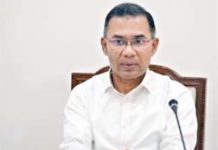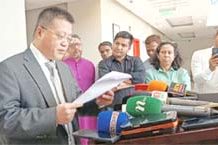C T Online Desk: Russia on Saturday toughened penalties for soldiers voluntarily surrendering or refusing to fight, with up to 10 years imprisonment, and it replaced its top logistics general after a series of setbacks to its seven-month war in Ukraine.
Those developments come days after Russia instigated a partial mobilisation affecting up to 300,000 additional troops, at a time when Kyiv has taken back more and more territory in a stunning counter-offensive.
Seemingly in response to the new Russian penalties, Ukrainian President Volodymyr Zelensky directly addressed Russian citizens on Saturday, telling them that their president was knowingly “sending citizens to their death.”
Speaking in Russian, he called on Moscow’s forces to surrender, saying, “You will be treated in a civilized manner… No one will know the circumstances of your surrendering.”
His pointed remarks came as Kremlin-held regions of eastern and southern Ukraine voted for a second day on whether to become part of Russia, dramatically raising the stakes in the conflict.
Integrating the four regions into Russia would mean that Moscow would consider any military move there as an attack on its own territory.
Zelensky has denounced the polls, on Friday calling them “crimes against international law and the law of Ukraine”.
Ukraine’s recent gains have laid bare flaws in Russia’s approach since it invaded on February 24, with some analysts seeing logistics as the weak link in Moscow’s army.
“Army General Dmitry Bulgakov has been relieved of the post of deputy minister of defence” and will be replaced by Colonel General Mikhail Mizintsev, aged 60, the defence ministry said.
Russia’s partial mobilisation, announced on Wednesday, will likely be one of Mizintsev’s first big logistical challenges, with the hundreds of thousands of reservists being called up needing equipment and training before deployment.
Military-age men have sought to leave, with flights full and neighbouring countries receiving an influx of Russians. Some 2,300 private vehicles were waiting at one crossing into Georgia, regional Russian authorities said.
“We were talking to our friends and many are thinking about leaving,” said Daria, 22, after fleeing Russia to Istanbul with many of her compatriots.
“Not everyone wanted to leave in February. The (mobilisation) decision of September 21 forced many to think about it again.”













